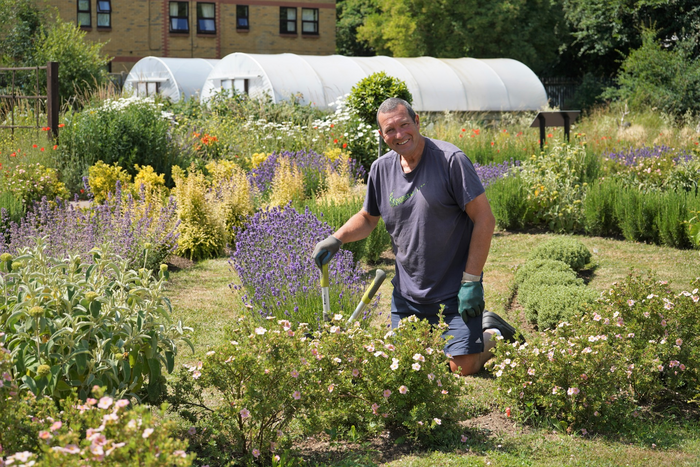Therapeutic community gardening helped reduce loneliness as the pandemic paralysed the nation, University of Essex research has revealed.
A study that unfolded across three years of the COVID-19 crisis found that horticulture schemes helped to maintain mental health despite national well-being plummeting.
The study followed people with mental health issues as they worked on therapeutic community gardens run by the charity Trust Links from 2019 to 2022.
As they sowed, planted and tended to vegetables and flowers their self-reported life satisfaction and mental well-being increased by 9%.
Incredibly the study used data collected before the coronavirus forced the world into unprecedented lockdowns and captured the benefits that nature-based therapeutic interventions can have in a time of crisis.
Dr Carly Wood is now calling for more investment and research into therapeutic gardening which could take the pressure off the NHS.
Dr Wood, from the School of Sport, Rehabilitation, and Exercise Sciences, said: “There is growing evidence to support the use of nature-based interventions for the treatment of mental ill-health and great potential to upscale the use of therapeutic community gardening through the Government and NHS’ Green Social Prescribing agenda.
“The pandemic drew this clearly into focus and showed that even as we coped with unprecedented disruption and upheaval community gardening has the power to help some of society’s most vulnerable people.
“I’m hoping this study will show the power of therapeutic community gardening and inspire more research into its benefits.”
The work – Published in the International Journal of Environmental Research and Public Health – studied 53 volunteers as they worked in the gardens.
Despite the majority being regular attendees to the charity’s gardens, the research showed loneliness decreased – whilst well-being and life satisfaction jumped up.
Trust Links welcomed the study and hopes more will be done to evaluate the benefits of therapeutic horticulture.
Matt King, the chief executive, said: “Through this evaluation with the University of Essex it is clear that our Growing Together therapeutic community gardening projects have a powerful impact on mental health and wellbeing, improving connections with other people, providing positive activities, giving people’s lives meaning and hope, and enabling people to spend time outdoors with nature.
“Further investment in these services will help reduce demand on the NHS and social care, helping us to grow communities and transform lives.”
The study is the latest in Essex’s ground-breaking investigation into the benefits of Green Exercise.
The term was coined at the university nearly 20 years ago and since then a series of studies have championed the soothing power of nature and how it can save taxpayers’ money whilst improving lives.

Credit: Trust Links/University of Essex
Therapeutic community gardening helped reduce loneliness as the pandemic paralysed the nation, University of Essex research has revealed.
A study that unfolded across three years of the COVID-19 crisis found that horticulture schemes helped to maintain mental health despite national well-being plummeting.
The study followed people with mental health issues as they worked on therapeutic community gardens run by the charity Trust Links from 2019 to 2022.
As they sowed, planted and tended to vegetables and flowers their self-reported life satisfaction and mental well-being increased by 9%.
Incredibly the study used data collected before the coronavirus forced the world into unprecedented lockdowns and captured the benefits that nature-based therapeutic interventions can have in a time of crisis.
Dr Carly Wood is now calling for more investment and research into therapeutic gardening which could take the pressure off the NHS.
Dr Wood, from the School of Sport, Rehabilitation, and Exercise Sciences, said: “There is growing evidence to support the use of nature-based interventions for the treatment of mental ill-health and great potential to upscale the use of therapeutic community gardening through the Government and NHS’ Green Social Prescribing agenda.
“The pandemic drew this clearly into focus and showed that even as we coped with unprecedented disruption and upheaval community gardening has the power to help some of society’s most vulnerable people.
“I’m hoping this study will show the power of therapeutic community gardening and inspire more research into its benefits.”
The work – Published in the International Journal of Environmental Research and Public Health – studied 53 volunteers as they worked in the gardens.
Despite the majority being regular attendees to the charity’s gardens, the research showed loneliness decreased – whilst well-being and life satisfaction jumped up.
Trust Links welcomed the study and hopes more will be done to evaluate the benefits of therapeutic horticulture.
Matt King, the chief executive, said: “Through this evaluation with the University of Essex it is clear that our Growing Together therapeutic community gardening projects have a powerful impact on mental health and wellbeing, improving connections with other people, providing positive activities, giving people’s lives meaning and hope, and enabling people to spend time outdoors with nature.
“Further investment in these services will help reduce demand on the NHS and social care, helping us to grow communities and transform lives.”
The study is the latest in Essex’s ground-breaking investigation into the benefits of Green Exercise.
The term was coined at the university nearly 20 years ago and since then a series of studies have championed the soothing power of nature and how it can save taxpayers’ money whilst improving lives.
Journal
International Journal of Environmental Research and Public Health
DOI
10.3390/ijerph192013166
Method of Research
Survey
Subject of Research
People
Article Title
The Impact of Therapeutic Community Gardening on the Wellbeing, Loneliness, and Life Satisfaction of Individuals with Mental Illness
Article Publication Date
13-Oct-2022




